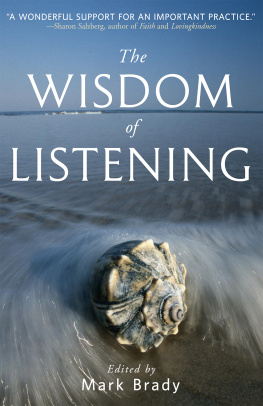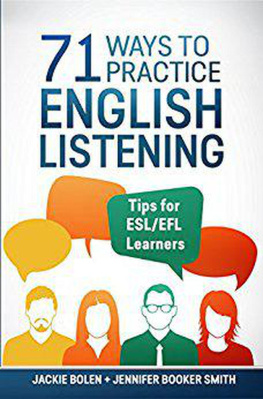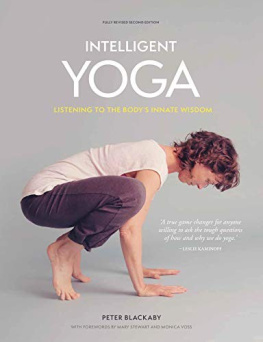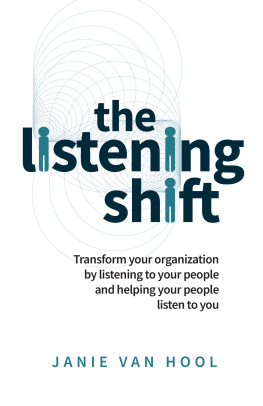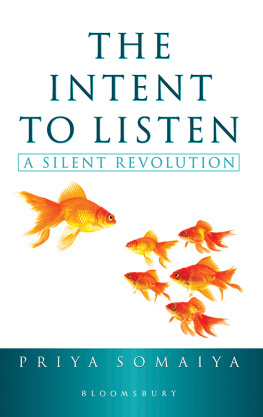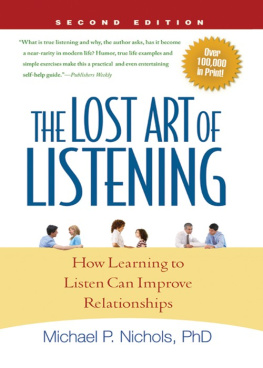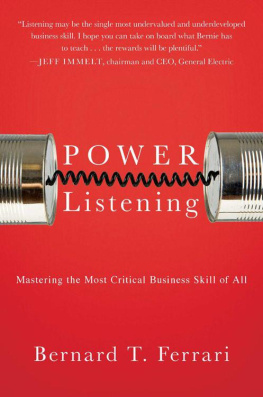Table of Contents
Preface
L ISTENING SKILLFULLY is difficult. To listen impeccably, with fixed, full J attention is a discipline much like meditation. It requires practice, rigor, and resolve. And when our efforts slacken, it may require forgiveness, gentleness, and sometimes a bit of creative inspiration to get ourselves back on track.
In Western culture listening has never been a prized pursuit, the way, for example, teaching or preaching has been. There will never be a Whos Who in American Listening. To pursue the desire to become a master listener, a listening warrior, requires turning away from the dominant culture to explore paths few have chosen.
This anthology has grown out of my own countercultural passion to become an increasingly skillful listener. Many years ago, a memorable college professor of mine, Jim Fadiman, encouraged an eager group of graduate students to teach what you most want to learn. This continues to be sage advice. Teaching what I most want to learn has forced me to focus deeply, to research accurately, and to bring sufficient creativity to make the topic interesting to others.
I am still exploring those depths with respect to listening and learningand the proof is in this anthology. In it I have followed another bit of advice from Dr. Fadiman: identify those teachers from whom youd most like to learn and go to them directly. It is a mentor/apprentice model that has served a variety of crafts and disciplines well over many centuries, and I have adapted it to the practice of listening. The contributors to this anthology are all consummate teachers with important things to teach meand I hope you as wellabout listening. Some of the contributors to this collection I knew personally beforehand; some only through their published writings; others were identified by the self-posed question: Who might teach me valuable things about listening?
The list that resulted from posing that question was a long one and many of them are included here. All these essays have one theme in common: listening is vital to psychological and spiritual growth, and the skillful cultivation of it requires ongoing, disciplined practice.
The articles in this anthology are a collection of thoughtful, instructive words on listening. They are also wise words, true words, useful words. A diligent reader of these words will come away with many benefits. To mention but a few, such a reader will:
uncover the skillful means to be more fully in the world, present and responsive, rather than distracted and reactive;
realize that listening is a practice, and a practice that takes practice, and being skillful does not require being perfect;
recognize and rectify the myriad ways in which the mind can close the ears;
find that listening skillfully nourishes others, and that we can teach others how to return that nourishment to us;
realize that unskillful listening has a variety of causes, and with practice we can learn to recognize and remedy them;
discover how listening skillfully to others can facilitate hearing and deeply honoring our own tender hearts;
recognize that there are ways to effectively listen in large groups, where distractions and competing agendas often make listening challenging;
find confirmation of the truth that words have power; and that listening can be accomplished in ways that channel words optimally, positively, and cooperatively.
...and there are many more unnamed benefits an earnest reader will find in putting into practice the teachings in this collection of listening wisdom.
Finally, I assert that human maturation seems to significantly correlate with an increasing capacity for skillful listening. It is as if the years spent focused on speaking words and thoughts centered around ones own unique experience and personal worldview soften the adamant need to prove our own points, or to consign others viewpoints to the background. There is more room available for the words and thoughts of others, space that can accommodate perspectives different from our own. Such maturity lends validity to the assertion that being able to fully hear and deeply respect your point of view, doesnt automatically require me to agree with you. The world is large enough to hold conflicting viewpoints, spacious enough for all of us to peacefully grow, learn and mature.
And so, it is my hope that this small collection of writings from wise teachers on listening will significantly contribute to the maturation of us all. According to Mother Teresa, listening is, after all, how God most frequently expresses his own spiritual maturity in the world.
Mark Brady
Los Altos, California
Fall 2003
P ART O NE
The Promise of Listening
We do not believe in ourselves until someone reveals that something deep inside us is valuable, worth listening to, worthy of our trust, sacred to our touch. Once we believe in ourselves we can risk curiosity, wonder, spontaneous delight or any experience that reveals the human spirit.
~ e. e. cummings

W e ourselves are arguably the most significant factor in any human exchange. More specifically: the quality of heart, wisdom, attention, and intention that we bring with us significantly impacts every exchange we conduct. In this contribution, hospice founder and longtime trainer of hospice workers, Christine Longaker provides ample evidence for the power of such heartfelt and attentive presence. In addition, she offers extensive possibilities for ways that regular meditation can shape, influence, and guide us both in the short term and, equally important, in the long term. As will quickly become evident, such presence cultivated wisely can produce transformative effects in virtually every area of our lives.
Listening with Presence, Awareness, and Love
Christine Longaker
E VERYTHING D EPENDS ON H OW W E A RE
W HEN A FRIEND is in tremendous emotional or physical pain, sometimes were afraid to go and be with him or her, or afraid of communicating honestly when we visit. We think we should know how to relieve our friends pain, or have just the right things to say. Yet what a person whos suffering most needs is our presence. The Greek word for one who comforts is paraclete, literally meaning one who comes to walk alongside. What we bring to support a friend is our loving presence, with perspective. More than anything we do or say, what helps a person who is suffering is how we are.
How we are is a reflection of the unified perspective we have on the whole of life, which includes experiences of joy and adversity. Our presence is also an expression of our confidence, the profound love and unqualified respect for others we have come to embody through our spiritual practice. How we are is also connected to our awareness of our own suffering and the extent to which we have worked through our grief. And finally, our loving presence depends upon our ability to acknowledge and then release our fears and expectations, remaining compassionate and receptive toward the other person.
Cultivating a daily practice of meditation, and then training ourselves to integrate the mindfulness of meditation whenever we communicate, helps us develop these qualities of loving presence, authenticity, and confidence.
M EDITATION: C ONNECTING WITH O UR T RUE N ATURE
Meditation is more than a relaxation exercise; it is a practice designed to connect us to our innermost essence of wisdom. When our mind settles deeply in meditation, the conceptual mind and ordinary sense of self may temporarily dissolve. Then we experience a gap or space between our thoughts: a wakeful, clear, radiant awareness unstained by hopes, fears, or habitual projections. Pursued deeply and sincerely, spiritual practice enables us to purify and release the emotional conditioning and self-grasping ego that separate us from reality. Meditation connects us ever more reliably and profoundly to a natural, effortless awareness, in which there is a deep relaxation and spaciousness, an unbounded gratitude, and an all-embracing, joyful compassion.

